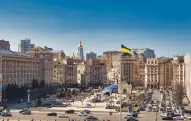Unraveling the Motives Behind Russia's Actions Towards European Banks
 Russian courts have taken drastic actions against European banks, with assets of Deutsche Bank and Commerzbank seized following legal proceedings. This development stems from the halted construction of a gas processing plant in Ust-Luga, originally spearheaded by the Linde Group, where both banks had financial involvement. Contracts for the project were inked in 2021, prior to geopolitical tensions escalating. However, Linde abandoned the venture due to Western sanctions against Russia.
Russian courts have taken drastic actions against European banks, with assets of Deutsche Bank and Commerzbank seized following legal proceedings. This development stems from the halted construction of a gas processing plant in Ust-Luga, originally spearheaded by the Linde Group, where both banks had financial involvement. Contracts for the project were inked in 2021, prior to geopolitical tensions escalating. However, Linde abandoned the venture due to Western sanctions against Russia.
According to disclosures from the court in St. Petersburg, Deutsche Bank faces the confiscation of assets totaling up to 238 million euros, including securities and real estate. The bank had provided a down payment guarantee for the gas plant project, with Linde's client being RusChemAlliance, partially owned by Gazprom Group. RusChemAlliance pursued legal action demanding payment, which Deutsche Bank refused citing sanctions. Commerzbank, too, is impacted, with the court ordering the seizure of assets amounting to 93.7 million euros, along with securities and the bank's Moscow premises.
In addition to these actions, major Italian bank Unicredit finds itself entangled in the aftermath of the collapsed Linde project, with assets worth approximately 460 million euros confiscated by the courts.
Deutsche Bank has earmarked provisions of 260 million euros for this situation, secured by a compensation agreement with a client. The bank stated uncertainty regarding the implementation of the court's decision and its potential ramifications on their operations in Russia.
These seizures mark a significant escalation in measures against European banks since the conflict's onset, possibly linked to a communication from the European Central Bank urging banks to expedite withdrawal plans or face harsher consequences from the US.
The US government is closely monitoring European banks' remaining presence in Russia, with Austrian bank Raiffeisen Bank International facing mounting pressure for its continued operations. Unlike its counterparts, Raiffeisen has yet to initiate a withdrawal from Russia, prompting concerns from US sanctions authorities regarding its alleged expansion in the region.
Since the Russian invasion of Ukraine, most Western banks have ceased operations in Russia, reducing their risk exposure significantly. Deutsche Bank, for instance, has ceased new business activities in Russia and observed a sharp decline in its risk positions and workforce in the country.
Before the conflict, German banks, including Deutsche Bank, played a substantial role in supporting Russia's fossil fuel economy. Deutsche Bank, in particular, provided significant financial assistance to leading Russian oil and gas companies. However, its involvement in facilitating capital outflows from Russia and allegations of potential interference in US affairs have drawn scrutiny and led to restrictions on its operations in Moscow.
Despite these challenges, the narrative of Deutsche Bank's ties to Russia persists, fueled by historical dealings and its association with prominent figures like former US President Trump.










































